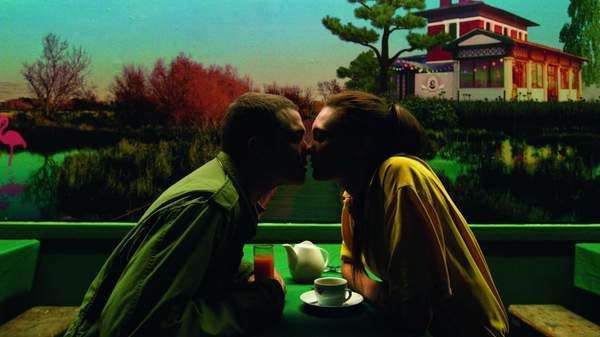Overview
Gaspar Noe is a filmmaker with vision — of that, there is little doubt. Whether his vision is something you would ever want to watch is where things get a little more complicated. An Argentinean expat living in France, he's best known among cineastes for his 2002 film Irreversible, a non-linear crime thriller whose bold cinematography and ruminations on revenge are inevitably overshadowed by discussions of its most notorious sequence: a nine-minute rape scene shot in one unflinching take.
Noe's most recent film, Love, isn't shy on graphic sexual content either, although thankfully this time it's of the consensual variety. Debuting at this year's Cannes Film Festival to a mixture of boos and rapturous applause, it's a divisive picture that bares all from the very first frame, opening with a static shot of a man and a woman masturbating one another to orgasm. It's the first of many long sequences of graphic non-simulated sex in the film — sex that Noe uses as emotional markers in his 130-minute portrait of a tumultuous young relationship gone bad.
The story, such as it is, is told from the perspective of Murphy (Karl Glusman), a self-involved American film student living in Paris with his French girlfriend Omi (Klara Kristin) and their infant son. After a drug-fuelled New Year's Eve, a groggy Murphy awakens to find a voice message on his phone from the concerned mother of Electra (Aomi Muyock), an ex-girlfriend who has gone missing, and for whom Murphy still harbours strong feelings. The rest of the film unfolds through a series of flashbacks, as Murphy reminisces about his tumultuous past with his former lover and the mistakes that tore them apart.
Like all of its director's films, Love is worth seeing for its formal elements alone. Long, gliding camera takes and blink-like edits capture the feeling of slipping into a memory, while Noe's use of lighting and colour, although less overt than in Irreversible or his 2009 headtrip Enter the Void, remains as evocative as ever. The soundtrack is a deliciously eclectic grab-bag that makes use of everything from classical compositions to slow electric guitar jams to the iconic score from Assault from Precinct 13. The latter track pops up during a scene set in an underground sex club, and frankly, could hardly sound more at home.
But most memorable of all is the film's use of 3D — and we're not just saying that because Noe includes a close-up of a penis ejaculating directly into the camera. A born provocateur, the director can't help but indulge his juvenile side — yet for the most part he uses the added dimension in subtler and more imaginative ways. A heated argument at a rave is made all the more intense by strobe lights firing from the back of the frame. A lengthy threesome, meanwhile, is shot from high above, its participants seeming to plunge deeper into the bed as their lovemaking picks up steam.
Indeed, it's the sex scenes that are perhaps the most elegant and fully realised segments of the film. At one point, Murphy talks about wanting to make a movie that shows "sentimental sexuality" — and that's clearly Noe's intention as well. Over the film's two-plus-hour runtime, Noe's depiction of sex ranges from loving to spiteful, exciting to mundane, erotic to repulsive and joyful to just plain sad. And yes, at times he aims to titillate. Yet he never loses sight of the human feeling behind the sex. As a result, Love never feels pornographic in the way you might expect.
But Love isn't just about sex. It's also about masculinity and misogyny — and it's in the film's handling of these prickly subjects that many viewers will (perhaps justifiably) take issue. It's hard to think of a film with a less sympathetic protagonist than Murphy. He's a selfish, whiny, insecure, arrogant, sexist, homophobic, slut-shaming loser who frankly made this writer embarrassed to be in the possession of a Y chromosome. But then again, that may very well be the point. Personally, we'd argue that Love condemns Murphy's views and behaviour. The truth, though, is that you could just as reasonably claim that it endorses them. And perhaps more to the point, no matter which reading you subscribe to, it won't make the dickhead's company any less difficult to stand.
Still, in a strange way, that's actually another aspect that makes the movie worth watching. Like we said at the outset, Noe is a filmmaker with vision — and to be brutally honest, we'd rather watch a disastrous, offensive failure than something bland and middle of the road. See Love. See it in 3D. For the craft, and for the arguments you'll have with people once it's over.
Love is screening exclusively at The Lido in Melbourne for a limited number of evening sessions. For tickets, head to the Lido website.
Features
Information
When
Thursday, October 29, 2015 - Wednesday, November 4, 2015
Thursday, October 29 - Wednesday, November 4, 2015
Where
The Lido675 Glenferrie Road
Hawthorn
